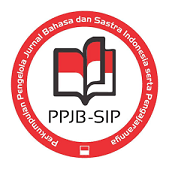PEMBERITAAN SIDANG MAHKAMAH KEHORMATAN DEWAN (MKD) DALAM SURAT KABAR KOMPAS DAN TRIBUN BALI: SEBUAH KAJIAN WACANA KRITIS
DOI:
https://doi.org/10.23887/jjpbs.v5i3.8689Abstract
Penelitian ini merupakan penelitian deskriptif kualitatif yang bertujuan untuk (1) mendeskripsikan kosakata pemberitaan sidang MKD (Mahkamah Kehormatan Dewan) di surat kabar Kompas dan Tribun Bali dan (2) mendeskripsikan tata bahasa pemberitaan sidang MKD (Mahkamah Kehormatan Dewan) di surat kabar Kompas dan Tribun Bali. Pengumpulan data menggunakan metode dokumentasi yang berupa pustaka. Instruments pengumpulan data pada penelitian ini menggunakan kartu data. Data dianalisis melalui beberapa tahapan yang meliputi, (1) reduksi data, (2) penyajian data, dan (3) penarikan simpulan. Hasil penelitian menunjukkan bahwa (1) Surat kabar Kompas dan surat kabar Tribun Bali lebih banyak menggunakan kosakata membuat klasifikasi dalam mengontruksi pemberitaan sidang MKD. Dalam surat kabar Kompas ditemukan 25 kosakata membuat klasifikasi, 14 kosakata membatasi pandangan, 1 kosakata pertarungan wacana, dan 2 kosakata marjinalisasi sedangkan dalam Tribun bali ditemukan 31 kosakata membuat klasifikasi, 14 kosakata membatasi pandangan, 4 kosakata pertarungan wacana, dan 9 kosakata marjinalisasi. (2) Surat kabar Kompas dan surat kabar Tribun Bali lebih banyak menggunakan tata bahasa efek bentuk kalimat pasif (penghilangan pelaku) dalam mengontruksi pemberitaan sidang MKD. Dalam surat kabar Kompas ditemukan 18 kalimat pasif dan 2 nominalisasi, sedangkan dalam surat kabar Tribun Bali ditemukan 15 kalimat pasif dan 3 nominalisasi.Kata Kunci : sidang MKD, Kompas, Tribun Bali, analisis wacana kritis, teori Roger Fowler, dkk.
This research is about descriptive qualitative research study aims to (1) to describe the vocabulary about the reporting of MKD (Mahkamah Kehormatan Dewan) trial in Kompas media and Tribun Bali, (2) to describe the grammatical about the reporting of MKD (Mahkamah Kehormatan Dewan) trial in Kompas media and Tribun Bali. The subject of this research is Kompas media and Tribun Bali. The object of this research the reporting of MKD trial. The gathering of the data done by documentation method such as literature. The instrument in the gathering of the data in this research is card of data. Data analysis of this research used descriptive technique with procedure (1) data reduction, (2) data presentation, and (3) concluding/verification. The result of this research explain about (1) the Kompas and Tribun Bali use more vocabulary that make the clasification in contruction the report of MKD Trial. In the Kompas newspaper found 25 vocabulary classified, 14 vocabulary restrict the view, first bout vocabulary discourse, and 2 vocabulary marginalization while in Tribun Bali found 31 vocabulary classified, 14 vocabulary restrict the view, 4 vocabulary fight discourse, and 9 vocabulary marginalization. (2) the Kompas and Tribun Bali use more passive grammatical; to lose character in contruction the report of MKD Trial. In the Kompas newspaper found 18 passive and 2 nominalization, whereas in Tribun Bali newspaper found 15 passive and 3 nominalizations.
keyword : MKD trial, Kompas, Tribun Bali, critical discourse analysis, Roger Fowler teory
Published
2016-11-02
Issue
Section
Articles
License
Authors who publish with the Jurnal Pendidikan Bahasa dan Sastra Indonesia Undiksha agree to the following terms:- Authors retain copyright and grant the journal the right of first publication with the work simultaneously licensed under a Creative Commons Attribution License (CC BY-SA 4.0) that allows others to share the work with an acknowledgment of the work's authorship and initial publication in this journal
- Authors are able to enter into separate, additional contractual arrangements for the non-exclusive distribution of the journal's published version of the work (e.g., post it to an institutional repository or publish it in a book), with an acknowledgment of its initial publication in this journal.
- Authors are permitted and encouraged to post their work online (e.g., in institutional repositories or on their website) prior to and during the submission process, as it can lead to productive exchanges, as well as earlier and greater citation of published work. (See The Effect of Open Access)







